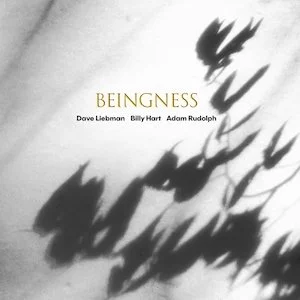Label: Meta / Defkaz Records, 2025
Personnel - Dave Liebman: soprano saxophone, wooden flutes; Billy Hart: drum set; Adam Rudolph: handrumset (kongos, djembe, tarija), piano, thumb piano, keyboards, gongs, dakha de bello, live electronic processing, percussion.
Saxophonist Dave Liebman and percussionist Adam Rudolph have collaborated in trio settings with several drummers over the years. For this session, recorded live at The Stone in 2023, they were joined by master drummer Billy Hart—called in at the last minute when Tyshawn Sorey became unavailable. Liebman first played with Hart on Miles Davis’ On the Corner (1972), while Rudolph, long fascinated by global rhythmic traditions, becomes a new creative partner as the trio explores intriguing sonic spaces with enviable confidence and ease. According to Rudolph’s liner notes: Beingness is the source of inspiration which moves silence towards its manifestations as form in sound.
“Unfolding” thrives on bi-directional rhythms that complement one another. Hart’s cymbal colors and geometric tom-tom patterns welcome Rudolph’s hand percussion—he later shifts to electronic processing—while Liebman narrates with bold intervals and spiky phrases wrapped in delay. “Intent” reveals an exciting, forward-thinking interplay, alive with mantra-like drum fluxes that support soprano ascents drawn in angular, asymmetric shapes.
Liebman’s inventive melodicism flows and punctuates with maturity on “Pathways”, whose swinging post-bop inflections and rousing percussion carry an energy ready to burst. The percussion duo savors the moment with reassuring heartbeats, shimmering cymbals, and juxtaposed rhythmic currents that translate into free, galvanizing locomotion. The Art Ensemble of Chicago comes to mind as the piece evokes forest dances, celestial praise, and tribal exultation. “Remembering the Future” places the trio in complete communion, laying down motifs and drones and combining them with long cymbal lines and supplicant horn moans.
The haunting “Transparent to Transcendence” features the chameleonic Rudolph on piano. He also sends synth waves echoing through the air and injects opportune electronics. Mystery and inquiry are reinforced by Liebman, who roams on soprano with expressive diction and tone. The piece ends in profound stillness, drawing the listener into its gravitational center. “Mystique” closes the album on a perplexing note, with nearly shamanic opacity in its rhythmic overtones.
Oscillating between passionate intensity and meditative restraint, this chordless trio bravely constructs a mix of consonant and dissonant polarities in an experimental voyage that feels as adventurous as it is spiritual.
Favorite Tracks:
02 - Intent ► 04 - Pathways ► 05 - Transparent to Transcendence














